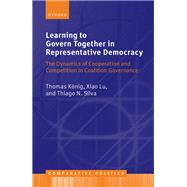Learning to Govern Together in Representative Democracy The Dynamics of Cooperation and Competition in Coalition Governance
, by König, Thomas; Lu, Xiao; Silva, Thiago N.- ISBN: 9780198959014 | 019895901X
- Cover: Hardcover
- Copyright: 8/29/2025
Learning to Govern Together in Representative Democracy introduces a dynamic theory on coalition governance and circular regression for studying joint policy-making of coalition parties, which considers the “pro tempore” nature of representative democracy. Because representative democracy limits the time to govern, the implementation of a common policy agenda is temporarily constrained. In parliamentary democracies, in which coalition governance is the rule, this temporal constraint demands that coalition parties overcome their collective action problems in joint policy-making within a term.
This book argues that the cooperative and competitive incentives of coalition parties vary over time. In the beginning of a term, coalition parties only have a prior belief about the type of partnership, and ministerial office-holders, who are responsible for the implementation of a common policy agenda, do not know how many bills they will initiate and whether their partner will respond cooperatively or competitively to their bill proposals. Over time, however, they can learn this type from experienced interactions in joint policy-making to optimize the timing of further bill initiation. To derive propositions and hypotheses on timing of bill initiation, the authors distinguish two learning models, a portfolio-model with autonomous learning from experienced interactions within the own jurisdiction, and a partisan-model with considering experienced interactions of co-partisan office-holders. The empirical examination of these models for the timing of bill initiation covers 11 parliamentary democracies, in which about 25.000 government bills were initiated and immediately approved or scrutinized in parliament. The findings show that ministerial office-holders infer the type of partnership from the duration of parliamentary scrutiny and initiate further bill proposals either early, if they learned about a cooperative type that immediately approved their bills, or late, if they learned about a competitive type that subjected their bills to intense parliamentary scrutiny. The results further reveal variation across the periods of a term, in which the cooperative and competitive incentives of coalition parties vary due to the temporal constrains for representative democracy.
The book provides an understanding of the dynamics of coalition effectiveness, stability of coalition government, and satisfaction with coalition governance, which are determined by learning about the cooperative or competitive partnership type, portfolio- or partisan learning, and the early or late timing of bill initiation.
Comparative Politics is a series for researchers, teachers, and students of political science that deals with contemporary government and politics. Global in scope, books in the series are characterized by a stress on comparative analysis and strong methodological rigour. The series is published in association with the European Consortium for Political Research. For more information visit: www.ecprnet.eu .
The series is edited by Nicole Bolleyer, Chair of Comparative Political Science, Geschwister Scholl Institut, LMU Munich and Jonathan Slapin, Professor of Political Institutions and European Politics, Department of Political Science, University of Zurich.
This is an open access title available under the terms of a CC BY-NC-ND 4.0 International licence. It is free to read at Oxford Scholarship Online and offered as a free PDF download from OUP and selected open access locations.
This book argues that the cooperative and competitive incentives of coalition parties vary over time. In the beginning of a term, coalition parties only have a prior belief about the type of partnership, and ministerial office-holders, who are responsible for the implementation of a common policy agenda, do not know how many bills they will initiate and whether their partner will respond cooperatively or competitively to their bill proposals. Over time, however, they can learn this type from experienced interactions in joint policy-making to optimize the timing of further bill initiation. To derive propositions and hypotheses on timing of bill initiation, the authors distinguish two learning models, a portfolio-model with autonomous learning from experienced interactions within the own jurisdiction, and a partisan-model with considering experienced interactions of co-partisan office-holders. The empirical examination of these models for the timing of bill initiation covers 11 parliamentary democracies, in which about 25.000 government bills were initiated and immediately approved or scrutinized in parliament. The findings show that ministerial office-holders infer the type of partnership from the duration of parliamentary scrutiny and initiate further bill proposals either early, if they learned about a cooperative type that immediately approved their bills, or late, if they learned about a competitive type that subjected their bills to intense parliamentary scrutiny. The results further reveal variation across the periods of a term, in which the cooperative and competitive incentives of coalition parties vary due to the temporal constrains for representative democracy.
The book provides an understanding of the dynamics of coalition effectiveness, stability of coalition government, and satisfaction with coalition governance, which are determined by learning about the cooperative or competitive partnership type, portfolio- or partisan learning, and the early or late timing of bill initiation.
Comparative Politics is a series for researchers, teachers, and students of political science that deals with contemporary government and politics. Global in scope, books in the series are characterized by a stress on comparative analysis and strong methodological rigour. The series is published in association with the European Consortium for Political Research. For more information visit: www.ecprnet.eu .
The series is edited by Nicole Bolleyer, Chair of Comparative Political Science, Geschwister Scholl Institut, LMU Munich and Jonathan Slapin, Professor of Political Institutions and European Politics, Department of Political Science, University of Zurich.
This is an open access title available under the terms of a CC BY-NC-ND 4.0 International licence. It is free to read at Oxford Scholarship Online and offered as a free PDF download from OUP and selected open access locations.






